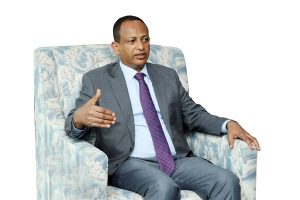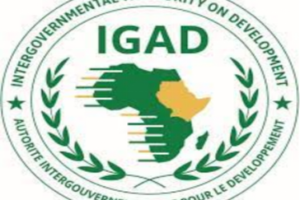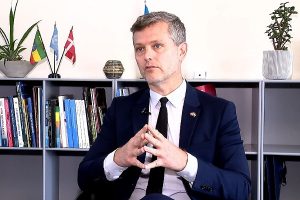
At the inauguration of Laureate Tsegaye Gebre Medhin’ Cultural Studies and Research Center on 21October 2019, Ambo University had conducted a Workshop in its Main Hall. On the occasion, Laureate Tsegaye Gebre Medhin was the center of discussion. Different intellectuals and his friends reminisced his great literary contributions and alluded to his personality. Samuel Leykun offered his speech regarding the establishment of the center at Ambo University.
Similarly, based on the topic« the person I know » Artist Abebe Balcha discussed the literary life of Laureate Tsegaye Gebre Medhin. Also stage activities borrowed from Laureate Tsegaye Gebre Medhin works were presented by Artist Teferi Alemu. In addition Ayalneh Mulatu, Playwright, Poet and Lecturer at Addis Ababa University stressed the need to establish a cultural center, how to go about it and its application in a higher education.
Furthermore, Laureate Tsegaye Gebre Medhin’s Poetry was overviewed by Architect and Artist Michael Shiferaw. From the major stage works of Laureate Tsegaye Gebre Medhin, Enat alem Tenu and Petros Yachin Seat were briefly presented as a sample on the stage. Petros was the Ethiopian bishop martyred by the Italian Fascists, for cursing citizens and the land if they abide by fascists’ colonizing rules.
The event was accentuated by entertainment and music the Balcha Entertainment Advertising Media presented. At the end, the participants of the Seminar presented different books to the Center and suggested the erection of a memorial monument for Laureate Tsegaye Gebre Medhin on the premise of Ambo University and at the heart of Addis Ababa. Yes, Laureate Tsegaye Gebre Medhin and other literary and artistic figures of Ethiopia should be honored forever. To this Ethiopian Writers Association in 2002 E.C in collaboration with Ethiopian Postal Service Enterprise honored Laureate Tsegaye through postal prints.
A living legend and a literary figure Laureate Tsegaye Gebre Medhin, who is considered as a poet, playwright, essayist, social critic, philologist, historiographer, dramatist, synthesis, peace activist, artistic director was born 17 August , 1936 at Boda, 30 km south of Ambo, and died on 25 February, 2006 in New York, USA.
His father Gebre Medhin Qawesa was an Oromo from Mecha, and his mother Weyzero Felekech Dange Haylu an Amhara from Ankober. According to Negussay Ayele (En. AEthipica 2010; 457), After receiving traditional education such as Zema and Qine in Ethiopic (Ge’ez) as well as Amharic in the traditional church school, Tsegaye, went to an elementary school in Ambo (1948-52) and studied English in the contemporary modern school or Asquala.
The young genius Tsegaye, who spoke Oromifa perfectly. When 13, he wrote his first play in English, it was the story of King Dionysus and of the Two Brothers, and saw it staged in Ambo Elementary School. It was watched by Emperor Haile Selassie I himself among others.
In 1956, the Poet graduated from Commercial Secondary School in Addis Ababa. In 1959, he received a Bachlor of Law at the Blackstone School of Law in Chicago. In1959-60 Tsegaye was granted a UNESCO Scholarship to study experimental theatre, which enabled him to visit the Royal Court Theatre in London, the Royal Theatre at Widsor, the Comedic Francaise in Paris and the Drama in Rome. The experimental theater that he saw in Britain, France and Italy helped him to unleash his talent, originate and direct theatres and dramas in his country.
It is also learnt that his artistic expression and literary genius were nurtured through his self-reading. During his time, Poet and playwright Tsegaye produced more than 30 Amharic plays including Yekermosew (A Man Future), Yedem Azmera, (Blood Harvest), Yeshoh Aklil, (Crown of Thorns) and Joro Degef (Mumps) and so on. Playwright Tsegaye modified from English Shakespeare’s plays such as King Lear, Othello and Macbeth as well as Moliere’s Tartouffe and others.
In 1966, the 29 years old Poet Tsegaye received the Haile Sellassie I Prize for Amharic Literature. On the other hand, Nigusay expressed «, In 2002 Tsegaye was a Nobel Prize candidate in Literature, and has been appreciated and honored abroad than in his own land. Perhaps this could reflect the old Ethiopian saying ‘a prophet is often not well esteemed and given his due in his own country.’ On this regard, it is not correct; because as to me, the Haile Sellassie I Prize seems an appreciation and admiration of his greatness.
During Ethiopian Revolution of 1974 and 1979, Laureate Tsegaye produced Ha Hu Besedst Wer (Imbibing the alphabet, ABC in Six Months), Inat Alem Tenu (adapted from Brecht’s Mother Courage or Mamasha Curazh and Melekte Wez Ader (Message of the Worker), Abugida Qeyiso. He also created Tewodros, Zeray Deres as well as Gammo, a play on the Ethiopian Revolution. Ha Hu Weyem Pe Pu (ABCor XYZ). In 1973, the first selection of his Amharic poems were published under the title: Issat wey Abeba (Fire or Flower). Laureate Tsegaye G/ Medhin originated the new poetic style called Eight Syllable or Simintu ye Tsegaye bet or Tsegaye’s verse. Literary, it is known as Yewol tatafi Gitim or Qene.
According to Nigussay, in the 1960’s, he presented his research as “Art in the Life of the Ethiopian People” at the First World Black Arts Festival Colloquium organized by UNESCO in Dakar, Senegal, and on “Kamit of Black Egyptian Theatre” for the Pan African Cultural Festival organized by the OAU in Algiers. He also presented several research papers including “Africa as the Origin of the Early Greek Theatre Culture” and “Ikher of Nagada:
The First Actor in the First City of Humankind” at international Africanist and Black Arts Congresses. His play, Oda Oak Oracle, was staged not only in Addis Ababa but also in Britain, Denmark, Italy, Rumania, Nigeria, Kenya, Tanzania and the United States in 1964. Currently, Tsegaye is being lauded as a “national treasure,” a “patriot of the pen,” “Ethiopia’s “Oak Tree,” etc. at home. Tsegaye who is considered Ethiopia’s leading poet served as director of the Haile Selassie I Theatre (now the National Theatre) from 1961 to 1971.
He later founded Addis Ababa University’s theatre department. Poet Laureate Tsegaye was awarded the Commander of the National Order of the Republic of Senegal at that time by President Leopold Sedar-Senghor. Poet Laureate Tsegaye received Gold Mercury International Award for Ethiopian Literature (1982); he was full bright Senior Resident Fellow at Columbia University (1985); he also was Co-winner (for the lyrics) of OAU African Unity Anthem Prize (1986) and winner of Ethiopia’s Golden Red Star Award (1987).
Laureate Tsegaye G/ Medhin who gave his life to his beloved country vividly captured the Ethiopian people, culture, history, freedom, humanity and heritage through his creative works. Unlikely, he delivered the issues of ethnic conflict, violence, war, aggression, illiteracy harassment, censorship by the ruling regimes, and appreciated patriotism, artistic existence, unity, progress, civilization and peaceful life in his works of literature.
The Ethiopian Herald Sunday Edition 24 November 2019
B Y T A DDELE GDLIE TSEGAYE (PhD)





